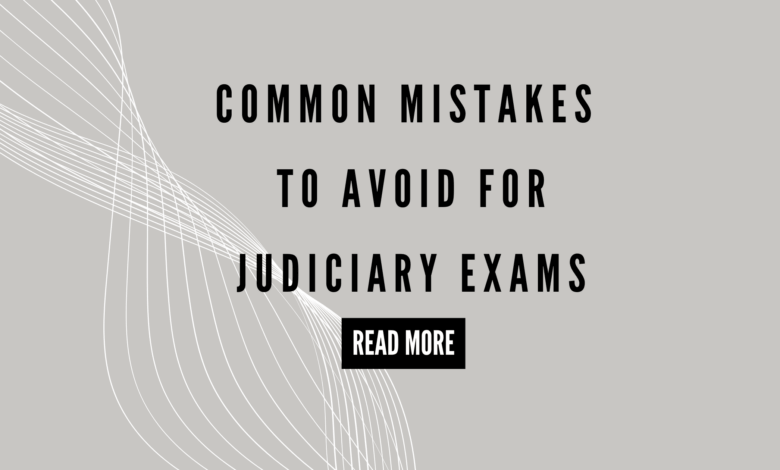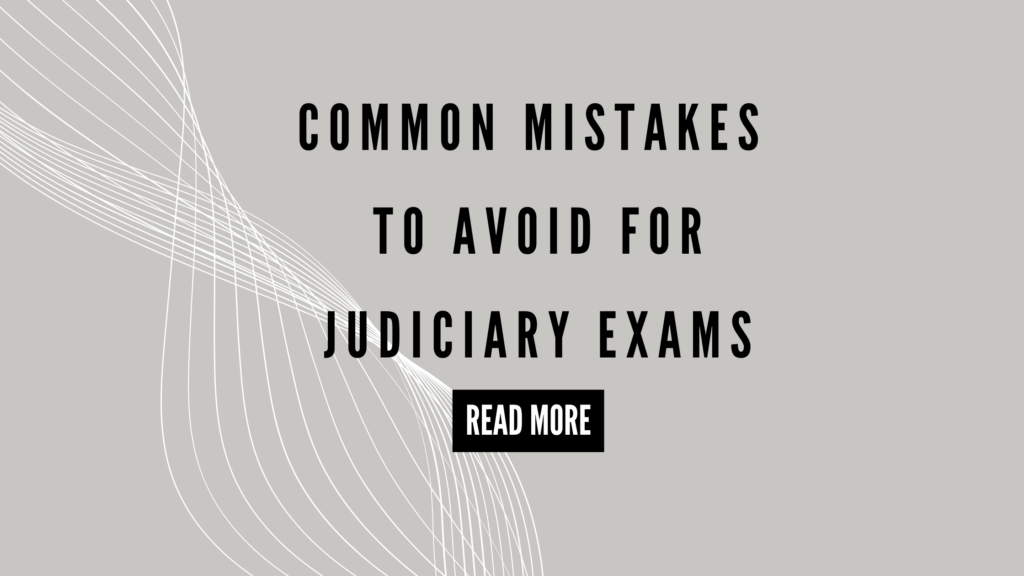Common Mistakes to Avoid When Preparing for Judiciary Exams
11 Common Mistakes to Avoid When Preparing for Judiciary Exams

Common Mistakes to Avoid When Preparing for Judiciary Exams
Preparing for judiciary exams can be a daunting yet rewarding journey. Aspiring judges often dedicate months, if not years, to ensure they crack this highly competitive examination. However, even with the best intentions, many candidates fall into common traps that hinder their progress. Avoiding these mistakes can significantly improve your chances of success.
In this blog, we will highlight some common mistakes candidates make when preparing for judiciary exams and provide practical tips to overcome them.
1. Lack of a Clear Study Plan
One of the biggest mistakes candidates make is starting their preparation without a proper study plan. Judiciary exams cover an extensive syllabus, and tackling it without a strategy can lead to confusion and wasted time.
What to do instead:
- Create a detailed timetable, allocating time for each subject based on its weightage and your comfort level.
- Include time for revision and mock tests in your plan.
- Stick to your schedule religiously.
2. Ignoring the Importance of the Syllabus
Many candidates underestimate the importance of thoroughly understanding the syllabus. They end up studying irrelevant topics, which wastes precious time and energy.

What to do instead:
- Download the official syllabus and keep it handy.
- Use it as a reference point to ensure you’re studying the right topics.
- Focus on the core areas such as procedural laws, substantive laws, and general knowledge.
3. Over-Reliance on Multiple Study Materials
Another common mistake is trying to cover too many books and resources. While it’s good to have a variety of references, over-reliance on multiple study materials can lead to confusion and lack of depth in understanding.
What to do instead:
- Stick to standard books and trusted resources.
- Choose one or two books per subject and master them.
- Avoid the temptation to keep switching between resources.
4. Neglecting Revision
Judiciary exams require not just learning but also retaining a vast amount of information. Many candidates focus solely on studying new topics and neglect revision, which is a crucial part of the preparation process.
What to do instead:
- Set aside dedicated time for regular revision.
- Revise previously studied topics weekly or bi-weekly.
- Use summary notes or flashcards to make revision more efficient.
5. Not Practicing Previous Year Question Papers
Skipping previous year question papers is a grave mistake. These papers provide valuable insights into the exam pattern, question types, and difficulty levels.
What to do instead:
- Solve at least the past 5-10 years of question papers.
- Analyze your performance to identify weak areas.
- Use these papers to practice time management.
6. Underestimating Mock Tests
Mock tests are essential for judiciary exam preparation, yet many candidates either skip them or take them lightly. This can lead to poor time management and low confidence during the actual exam.
What to do instead:
- Take regular mock tests under exam-like conditions.
- Evaluate your performance critically to identify and rectify mistakes.
- Use mock tests to build your stamina for the actual exam.
7. Ignoring Current Affairs and General Knowledge
Current affairs and general knowledge are often overlooked by judiciary aspirants, even though they form a significant part of the exam.
What to do instead:
- Read newspapers daily and follow credible news sources.
- Focus on legal news, landmark judgments, and constitutional amendments.
- Use monthly current affairs compilations for quick revisions.
How to Win Child Custody for Mothers in India
8. Procrastination and Lack of Discipline
Procrastination is a common enemy of success. Many candidates delay their preparation or skip study sessions, which hampers consistency and progress.
What to do instead:
- Set realistic daily and weekly goals.
- Reward yourself for meeting your targets to stay motivated.
- Maintain a disciplined routine, even on weekends.
9. Neglecting Physical and Mental Health
Burnout and stress are common during judiciary exam preparation. Ignoring physical and mental health can have serious consequences, affecting your focus and productivity.
What to do instead:
- Follow a healthy diet and stay hydrated.
- Incorporate physical activities like yoga or walking into your daily routine.
- Take short breaks to relax and rejuvenate.
- Practice mindfulness or meditation to manage stress.
10. Not Seeking Guidance When Needed
Preparing for judiciary exams can sometimes feel overwhelming, especially if you’re unsure about certain subjects or strategies. Many candidates hesitate to seek guidance, which can hinder their progress.
What to do instead:
- Join a reputed coaching institute or online course if needed.
- Connect with mentors or peers who have successfully cleared the exam.
- Participate in study groups to share knowledge and resources.
11. Underestimating Language Skills
Judiciary exams often include language-based sections such as essay writing, translation, or precise writing. Neglecting these skills can impact your overall score.
What to do instead:
- Practice writing essays on legal topics to improve articulation.
- Work on grammar, vocabulary, and sentence structure.
- Read legal journals and editorials to enhance your comprehension skills.
Conclusion
Avoiding these common mistakes when preparing for judiciary exams can make a significant difference in your preparation journey. Success in these exams requires a combination of hard work, smart strategies, and consistent effort. By planning effectively, staying disciplined, and focusing on your health, you can set yourself up for success.
Remember, every aspirant faces challenges, but learning from your mistakes and adapting is key. Stay positive, stay focused, and keep moving forward. Your dedication and perseverance will ultimately pay off.



